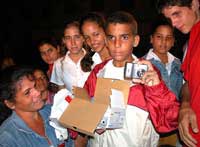sound far, far closer to everything ELSE I've heard from other people who go there, or who have been there many times, not to mention times you have even worked there, for crying out loud.
As you already know, there are DU'ers who maintain warm, close relationships with people they know in Cuba which have lasted for years. One DU'er especially has discussed on another message board the fact she used to, before
George W. Bush, of course, regularly send articles through the mail, through various services to her acquaintances there, and they have NEVER been intercepted in that country.
That's why they even have stores in Florida for Cuban-Americans to ship things to their friends and relatives there: have, for years. If this service didn't work, if things were grabbed by "the Cuban government," it wouldn't be a good business proposition, would it, to continue trying to send things to people there? Oh, well!
He's a very cute little fella. The photo taken of him with his picture is really sweet, what a smile!

Here's a photo taken of him after he returned home, and finally got a camera, similar to the one he had been promised, provided by his own country, instead.
It sounds as if it was a very unpleasant moment, as they bestowed cameras to all the other winners from other countries, then came to him with a box from Nikon containing art supplies, so he could DRAW A DAMNED PICTURE of images he wanted to record!
I don't know a thing about digital cameras, have never even held one, yet, so I can't grasp a clue about the one he got as a substitute. I would imagine his country gave him a good one.

By the way, Raysel Sosa González has hemophilia, a fairly unusual disease. Hope he's going to be o.k. At least he has access to a medical team, which should be helpful.